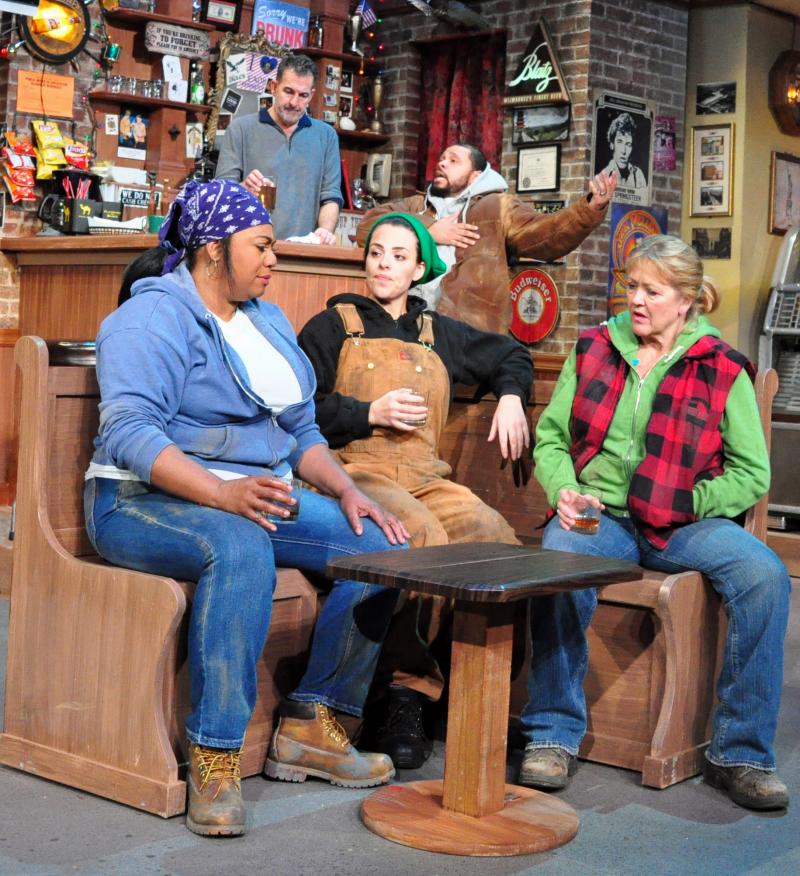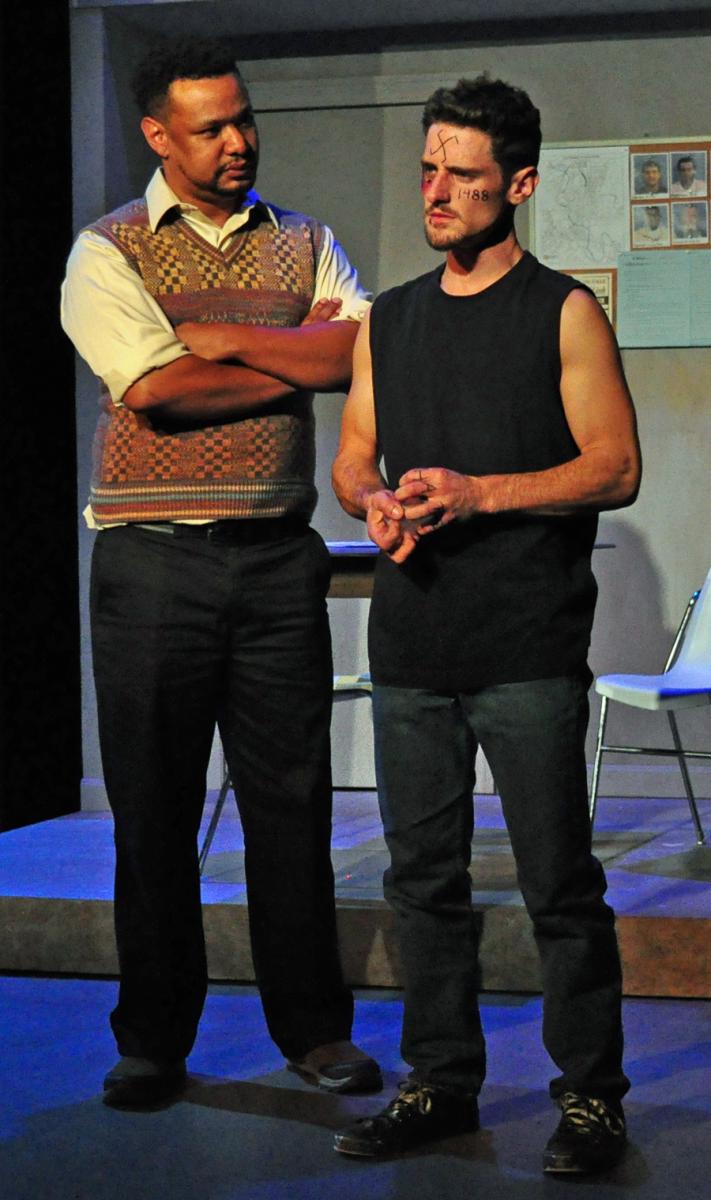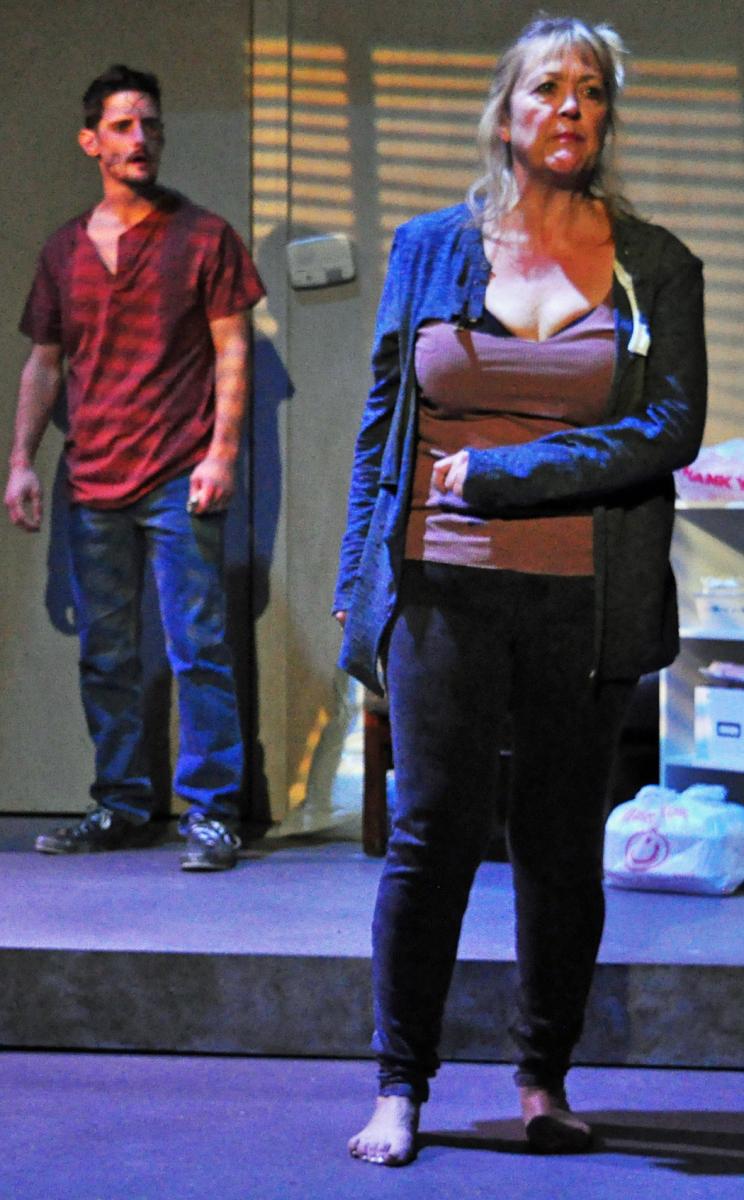Review: SWEAT at Unicorn Theatre
Powerful story, top notch stagecraft, and excellent acting make the Unicorn production of "Sweat" by Lynn Nottage a must see before you cast your ballot on November 6. "Sweat" begins to explain divisions in the 2018 electorate and how they developed. The Pulitzer committee agreed and awarded this work the prize for drama in 2017.

Nottage's exploration of American manufacturing and the blue-collar world is less a polemic than it is an observation of the evolution of work in America. NAFTA (the North American Free Trade Agreement), beginning in 1994, is cited as cause for the decline of "a making things culture" in industrial America. NAFTA is a whipping boy. Relocation to Mexico is a metaphor for relocation to any one of a number of cheaper places to manufacture.
"Sweat" takes place in Redding, Pennsylvania. Redding is hurting. Jobs have gone away. Union protections have evaporated.
The play opens in the small office of Parole Monitor Evan (Keenan Ramos). Evan is sequentially interviewing two of his charges. The year is around 2015. The parole officer's office is the kick off to a story told mainly in flashback.
The first interviewee is Jason (Matthew J. Lindblom), an angry, mostly monosyllabic, young white man with Nazi image tattoos prominently displayed on his face along with evidence of a recent barroom brawl. He is an assumed member of an Aryan Nation type prison gang. He has found a minimum wage job and a bed in a homeless shelter.
 The second of Evan's clients is a young man named Chris (Teddy Trice) of African-American descent. He appears to be a much milder individual than Jason. Chris shows remorse for the actions that resulted in his prison term. He is living in a church in exchange for doing odd jobs and trying to right the pathways of his life through religion.
The second of Evan's clients is a young man named Chris (Teddy Trice) of African-American descent. He appears to be a much milder individual than Jason. Chris shows remorse for the actions that resulted in his prison term. He is living in a church in exchange for doing odd jobs and trying to right the pathways of his life through religion.
Both were recently released from prison. We will later learn these two very different individuals grew up together, were best friends, and that they have been jailed for the same criminal act.
Most of the play's action takes place in a local tavern. It is a "Cheers" kind of spot "where everyone knows your name." A small flat screen television hangs is upstage center. Short news reports throughout the performance locate the scenes in time and space.
Many of the following individual scenes are centered around the birthday celebrations of three long-time female friends. Each has worked for decades on the floor of the medium sized industrial manufacturer. Rumors are circulating that the employer will move the operation to lower wage Mexico where unions are not a concern. The time is around the turn of the 21st century.
Jessie (Vanessa A. Davis) is the first of the friends to arrive. She is a young divorcee who is also a long time manufacturing worker. Jessie has clearly had too much to drink.
The bartender Stan (Greg Butell) kindly watches out for Jessica. He refuses to allow her to become any more inebriated. Stan too is a veteran of the plant that all the people we meet share. He was injured on the line and involuntarily retired.
Next to arrive is Tracey (Jan Rogge). She has 28 years on the floor. She is a regular at the tavern and the mother of Jason who we have just met at the Parole office. It is a different time. Jason is working at the plant and doing well. He is saving for his first motorcycle. The prison tattoos are gone from his face. Tracey is blond, single, late middle aged, blue collar, and a worker bee, doing well, but concerned about the rumors.
Cynthia (Cecilia Ananya) is Tracey's long-time friend, an attractive black woman, a little younger than Tracey, but a little more ambitious too. Cynthia is separated from her husband Brucie (Lewis J. Morrow). Brucie was involved in the textile industry until the company for which he worked suddenly closed and moved south of the border. Brucie has become a hopeless drug user. Cynthia and Brucie are Chris's parents. Chris (in the flashback) also works at the plant with his Mother. His goal is to attend college and become a teacher. 
Cynthia has heard that a plant supervisor has moved on and an opening might be available. She applies and gets the job. Her promotion sets in motion a series of unfortunate events. Racial cracks unfairly surface in Cynthia's relationship with Tracey. The rumors about the plant are true. The plant's owners want union concessions in wages and benefits or they will move to Mexico a la NAFTA. The Union strikes. Non-Union workers are hired including Stan's bar assistant, a native born Latino American named Oscar (Justin Barron).
The divides between the whites and the blacks and the Latinos and management and labor split wide open. Boiled down, all this is driven by fear of poverty and fear of the "others." A final confrontation culminates in the violent act that hurts a bystander and sends Chris and Jason to prison.
"Sweat" features a balanced and professional cast. It is intense, but then it is meant to be. Draw your own conclusions. Neither the playwright or Director Ian R Crawford will impose their views on you.
The set for "Sweat" by Gene Friedman is excellent. Rooms and exteriors are loaded on wagons that appear and rotate stage left and right. The scheme for multiple scene changes works well even with a relatively large cast and limited stage space.
"Sweat" by Lynn Nottage continues at the Unicorn Theatre through November 11. It is several hours definitely worth spending at the theater. Tickets are available online or by telephone.
Photos courtesy of Unicorn Theatre and Cynthia Levin
Comments
.png)
|
.png)
|
Videos

